Movie Review – Casablanca
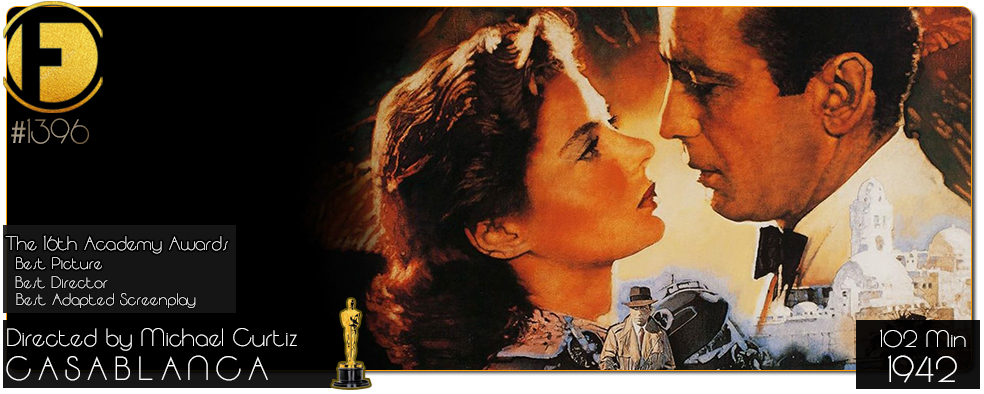
Principal Cast : Humphrey Bogart, Ingrid Bergman, Paul Henreid, Claude Rains, Conrad Veidt, Sydney Greenstreet, Peter Lorre, Curt Bois, Leonid Kinskey, Madeline LeBeau, Joy Page, John Qualen, S Z Sakell, Dooley Wilson. Uncredited: Marcel Dalio, Helmut Dantine, Gregory Gaye, Torbin Meyer, Corinna Mura, Frank Puglia, Dan Seymour, Gerald Oliver Smith, Norma Varden.
Synopsis: In Casablanca in December 1941, a cynical American expatriate encounters a former lover, with unforeseen complications.
*********
Few films are as iconic and immediately quotable as this classic 1942 film from Warner Bros, the Humphrey Bogart/Ingrid Bergman romantic “thriller”, Casablanca. With its wartime setting, exotic locale (although filmed entirely on the Warner Bros studio lot) and quintessentially 40’s dialogue, Casablanca has become better known for it’s fistful of famous lines, including the oft-misquoted “Play it again, Sam. Play “As Time Goes By.” Replete with captivating performances from Bogart and Bergman, as well as supporting roles from the Invisible Man himself Claude Rains, as well as industry stalwarts Conrad Veidt, Peter Lorre and Sydney Greenstreet, Michael Curtiz’ direction and the superb photography of The Invisible Man and Frankenstein DP Arthur Edeson bring the high point of Hollywood’s Golden Age to life with this astonishingly brilliant film.
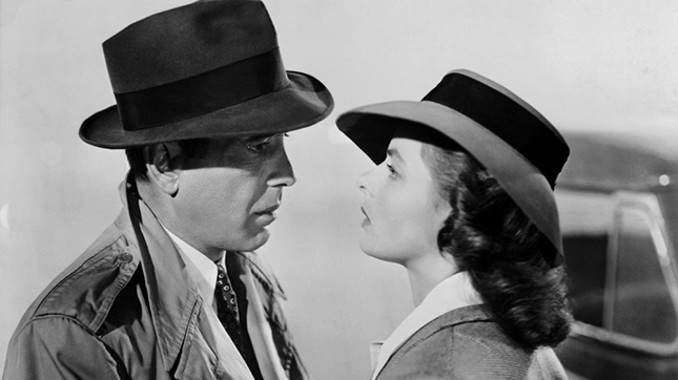
Set in Casablanca in December, 1941, a stream of refugees from Nazi Europe fled across the Mediterranean to the North African settlement seeking passage to Lisbon, Portugal, from which ships sailed to America and freedom. Expatriate American Rick Blaine (Bogart) owns a bar in Casablanca, where he spars verbally with local French Captain Louis Renault (Claude Rains), trying to stay out of trouble but assisting the variety of underworld figures preying upon those less fortunate and desperate. Following the murder of two German officials, Rick comes into possession of highly valuable letters of transit, which are of great interest to Nazi Gestapo Major Heinrich Strasser (Conrad Veidt), who is pursuing concentration camp escapee Victor Laszlo (Paul Henreid) and his wife Ilsa (Ingrid Bergman) before they can escape to America. Ilsa, who is also a former lover of Ricks, arrives in Rick’s bar and becomes caught up in her past infatuation with the man, beseeching him to give her the papers and flee back to America with her.
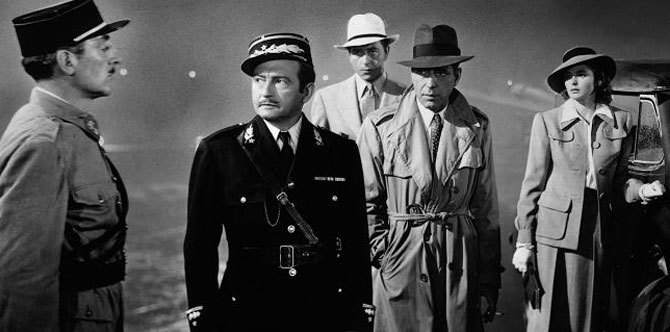
There are very few elements to Casablanca that don’t work. Films that have achieved such legendary status among fans of cinema tend to have only a few, but Casablanca is one of those rare beasts that has even less than the average. Everything, from its cast, to script, to set design and astonishing photography, through to that instantly memorable theme song (so memorable that Warner Bros adopted it as their studio’s thematic musical motif) just works; the elements of Casablanca coalesce into something so special, so beautiful, it’s a wonder the film wasn’t as highly successful on debut as it is retrospectively. Although considered a classic today, Casablanca’s production-line gestation and release saw it open to fair reviews but middling financial success. Repeated warm-fuzzy screenings and an innate osmotic acceptance by popular culture have endeared it to audiences worldwide in the long decades since, notably for its quotes and the sizzling chemistry between Bogart and Bergman.
“Here’s looking at you, kid.” – Humphrey Bogart
Casablanca is based on a then unproduced stage play “Everybody Comes To Rick’s”, and filmed during May 1942, barely six months after the attack on Pearl Harbor, an event which would see America go from a neutral entity in the global conflict to a full-time participant. This makes much of Casablanca’s freedom subtext ring only that much louder today, especially considering that country’s current intransigence towards those fleeing persecution, while the encroaching Nazi storm turns from mild zephyr to thunderous murder-call within the short space of a few scenes. Rick, embodying the cynical and unperturbed America of the day, is forced to make a decision about his stance against the Nazi threat, mirroring the very real notion of the United States entering World War II and embracing its long-time position as a world leader. It’s an intriguing narrative inducement, that’s for sure, and it makes Casablanca as pertinent today as it was in 1942, which in itself is remarkable.
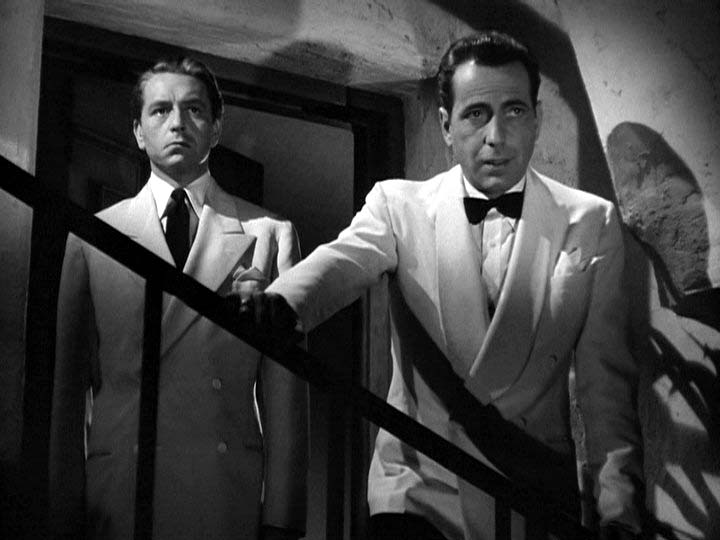
The screenplay, credited to brothers Julius and Phillip Epstein and one-time Orson Welles Invaders From Mars radio-panic writer Howard E Koch, borders on being a straight up film noir, but retains many elements that discredit such a claim; notably, its hot-boiled romantic subplot. Bogart’s Rick is the eponymous Lone Wolf archetype, distant and yet melancholy about love, embittered but strangely accepting of this inherent sadness, whilst Bergman’s doe-eyed Ilsa, who whispers and trembling-lips her way through a barrage of emotional wavelets, could almost be that feminine silhouette against a gumshoe’s doorframe. The framing device of the letters Rick holds for the majority of the film are used as a MacGuffin to keep Ilsa and Victor at bay, while Rick ruminates on his steamy (sexual) past with Ilsa in Paris prior to the Nazi invasion only years earlier. This past, and Rick’s apparent disdain for “their” song, “As Time Goes By”, is recounted via flashback to a time when the gloom of war hung heavy across France, a rose of blossoming love hard up against the grey.
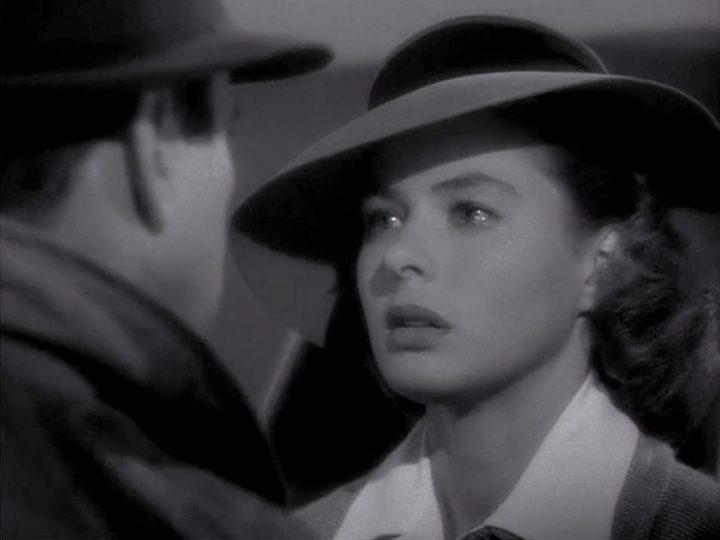
The film interweaves this romance (and subsequent angst) with the Nazi threat and Claude Rains’ hilariously charming Renault as he obliquely obeys his Nazi superiors whilst assisting Rick’s plans to subvert them. Director Michael Curtiz, who had directed The Adventures Of Robin Hood only four years prior, and who would go on to helm Bing Crosby’s White Christmas, elevates the material further with a startling command of the camera. With the film boasting a generous ensemble cast spread throughout Rick’s bar and into the streets of Casablanca itself, Curtiz easily keeps the film’s segmented scenes juggled to perfection, eschewing staid, plain helmsmanship for charismatic, layered storytelling. It moves at a brisk pace, does Casablanca, with a variety of characters both comedic and serious gracing the screen with skill and keeping the undercurrent of menace bubbling while subverting that with a wry sense of playful humour. Casablanca ain’t a laugh-fest, but at times it is quite amusing.
While the chemistry between Bogart and Bergman is positively white hot (acclaimed reviewer Roger Ebert once said “Bergman painted Bogart’s face with her eyes”, which I must say is one of the most erotic things that could be said for a film produced under the restrictive Hays Code period) the supporting cast carry their fair burden of work. Rains, as mentioned, is a delight, while equal top-billed actor Paul Henreid does very little to warrant such a position, although his role is thankless, and of all those in the film, the most forgettable. Veidt makes a terrific villain (he had appeared as one in the iconic German masterpiece The Cabinet Of Caligari) while Sydney Greenstreet is foppishly lovable as Rick’s main competitors for Casablanca’s nightlife, Signor Ferrari. Of course, the wonderful Dooley Wilson plays Sam, the club’s pianist and the man through whom much of the film’s iconic musical landscape is filtered. It’s he who croons “As Time Goes By” and “The Very Thought of You”, and it’s he who must “play it again” at the request of both Ilsa and Rick.
I can’t fight it anymore. I ran away from you once. I can’t do it again. Oh, I don’t know what’s right any longer. You have to think for both of us. For all of us. – Ingrid Bergman
Much should rightly be made of Casablanca’s cinematography, which as I mentioned earlier, was achieved by legendary Arthur Edeson. The film’s use of soft-focus shots for Bergman, giving her an almost perennially tearful look (“catch lighting” made her eyes glint, something I never knew about until now) is remarkably effective, while Bogart’s slick-back hair and debonair white sports jacket is an ensemble that’s impossible to photograph badly. The costume design all-round is wonderful, captured in Edeson’s crisp black and white look, which progressively becomes darker and more shadowy as the story progresses. The film opens in bright brilliant African sunlight, and concludes with its famous airport finale (during which is uttered the classic “hill of beans” line, as well as the “a beautiful friendship” closer) in near darkness and fog, emulating not only the dire situation our characters find themselves in but also the omnipresent foreboding of German evil across the globe. Edeson gives Rick’s club a heavily arched sense of fun with lots of breezy open space and light, before the evening and closing hours turn it into a vaguely dangerous, menacing establishment. The lighting on Bergman towards the film’s conclusion, with shadows playing across her face and providing contrast to match her emotional state, is effective and subtle.
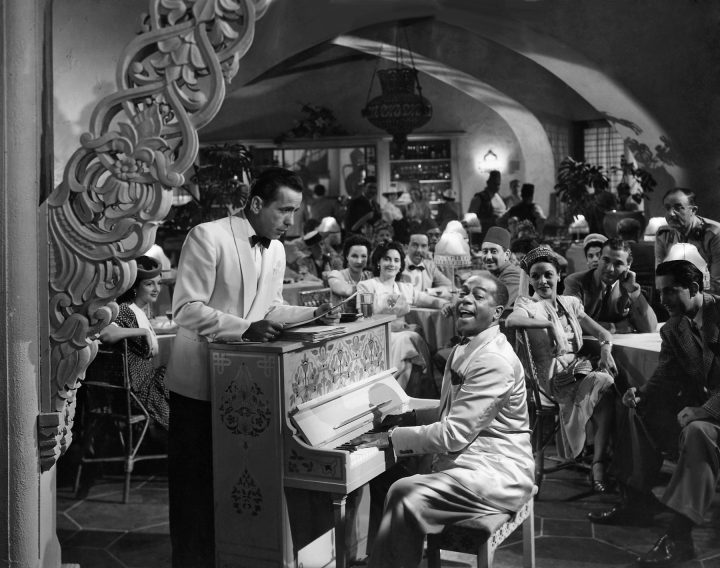
Casablanca is rightfully considered one of the greatest films ever made. It most definitely challenges for that title, and its three Academy Award wins (out of 8 nominations) bear testament to the quality of the film even today. The film’s easily identifiable lines and genuine chemistry between the leads, not to mention the stunning cinematography and surprisingly alacritous pace are intertwined with solid story and acting on all fronts, with even the most minor of roles making an impact in their own way. Casablanca is Golden Age Hollywood at its most pure, a refinement and elegance of storytelling that defies nostalgia and remains firmly entrenched in modernity despite the years since its debut.

Nice review. I think the last time I watched this was in college, but it’s always stuck with me as an incredible film. I’m certainly due for a rewatch, but maybe I’ll wait for the inevitable 4K disc. The acting is phenomenal, as well as the black-and-white cinematography. Best film ever made? Probably.
If it isn’t #1, then it’s definitely top 3 or 4, easily. A terrific film. Brilliantly photographed as well.
WOW!!! This is a stellar review. Love the depth with which you praise the film. Interesting point you make about Rick reflecting America’s stand on WWII. I’ve never thought of it like that, makes the film all the more impressive when you think about when it came out. Also interesting point about the way they chose to shoot Bergman. Whenever I think back to the film, Ilsa is always a soft and glowing image while Rick is crisp and solid. Great review again, will definitely take these points into consideration when I eventually review it
Thanks KG! I think the analogous motifs of Casablanca to America’s insertion into World War II are wide-ranging and subtle. The bombing of Pearl Harbor effectively forced the US into the war, much like Rick here is essentially forced to make a decision that is totally out of his control (or interest, really). If you look at the film from a globalist perspective there’s a lot to unpack, I think. Boil it all down, however, and you still have a supercharged story of tragic love and loss ahead of the backdrop of terror and death, a spectral suffocation that weighs heavily upon the film not only from an overarching plot level but also for each individual character.
One of the things I have discovered whilst watching a lot of these older films (my review of Grand Hotel also alludes to it) is that a lot of the higher profile actresses had their own personal makeup artists and cinematographers, specifically to capture them at their best angles. I guess if you’re making something that will last forever like film you want to get things right, but it’s a fascinating insight into Hollywood’s golden age that I had never realised before. Some actresses actually went so far as to stipulate which DOP’s were brought onto their films to ensure they shot them the right way.
Could you imagine a Streep or Hathaway trying this kind of thing! LOL!!!
So very glad to see you enjoyed this. It is a marvel of film-making. So true that there is very little about this film that doesn’t work.
Hate to THAT guy, but I do have to point something out. You said it started production six months before Pearl Harbor while, in fact, May of 1942 is six months after that attack. I think it’s just a typo given the rest of what you wrote, but it’s an important distinction to make.
Anyhoo, I think I solved my commenting issues, here.
Haha, yes you can comment again! LOL!!!
Thanks for picking up that error mate, I’ve amended my review accordingly. Always happy to get things right if I make a mistake!
Great to see that score and read the love. If I was forced at gunpoint to name my favorite film ever made I’ve always landed on Casablanca. For me it is absolute perfection.
I remember seeing it as a kid back in the day and I didn’t think much of it (I thought it was boring and silly), and it’s only now as an adult I can reflect on just how perfect a film it is. Definitely worthy of its status as a Hollywood classic, if not THE Hollywood classic. Bogart and Bergman’s chemistry is scintillating.